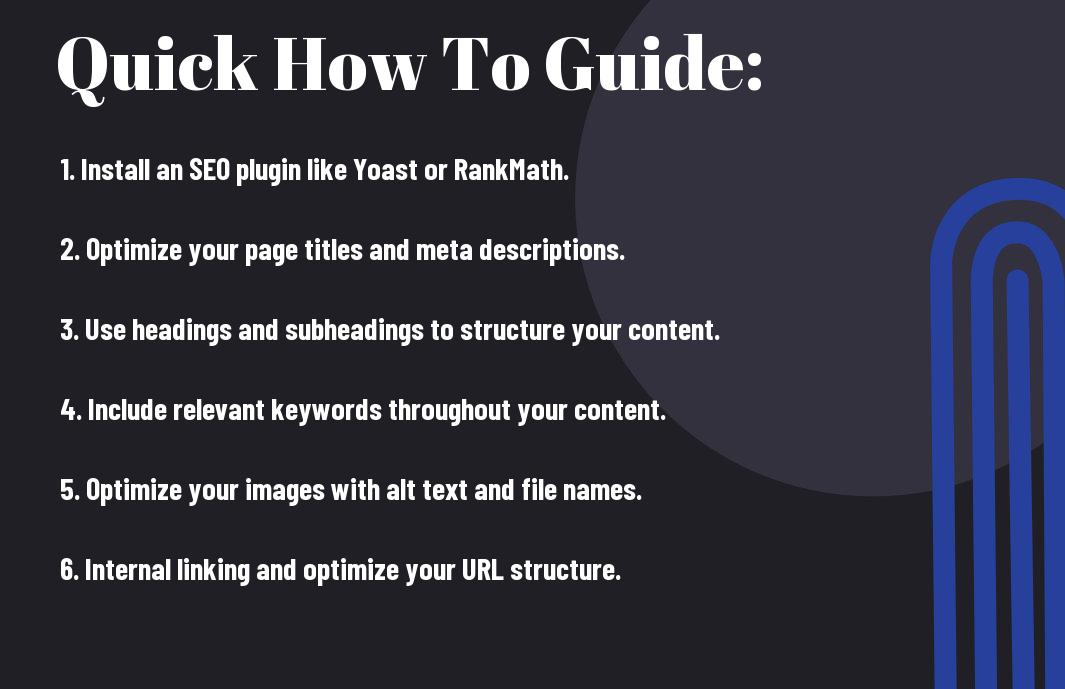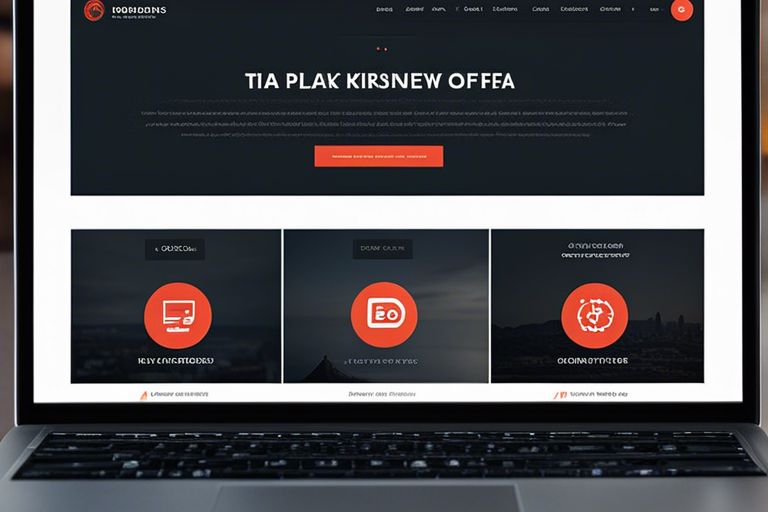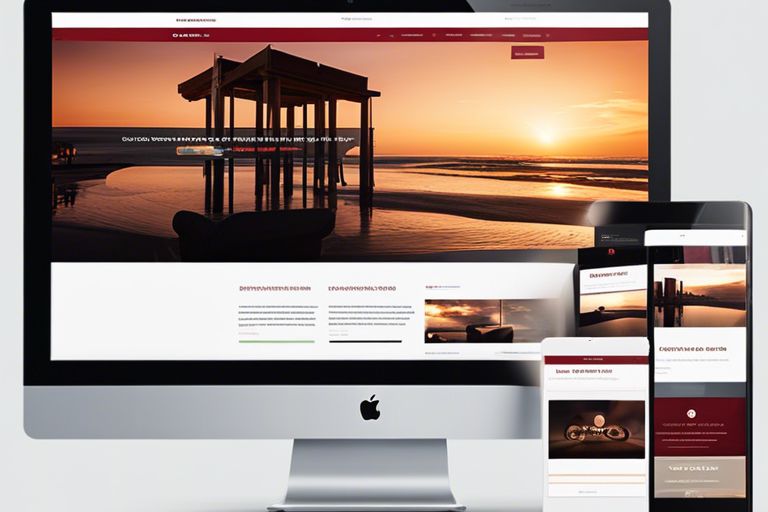WordPress websites stand to benefit enormously from optimizing on-page SEO techniques to improve search engine rankings. By strategically placing keywords, optimizing meta tags, creating relevant content, and improving website loading speed, your WordPress site can attract more organic traffic and enhance user experience. This comprehensive guide will walk you through the crucial steps to effectively implement on-page SEO strategies on your WordPress website, ensuring it is well-optimized for search engines and poised for success.
Key Takeaways:
- Optimize your titles and meta descriptions: Ensure that your page titles and meta descriptions contain relevant keywords and accurately reflect the content of the page.
- Use headings and subheadings: Organize your content with proper heading tags (H1, H2, H3, etc.) to improve readability and help search engines understand the structure of your page.
- Optimize your images: Use descriptive filenames and alt text for your images to make them more search engine friendly. Compress your images to improve page loading speed, which can also impact SEO.

Getting Started with On-Page SEO in WordPress
Setting Up a WordPress SEO Plugin
It is imperative to kickstart your on-page SEO efforts by setting up a reliable WordPress SEO plugin. These plugins help you optimize your content for search engines without the need for technical expertise. Popular options like Yoast SEO and All in One SEO Pack offer a user-friendly interface and valuable features to improve your website’s search engine visibility.
Conducting Keyword Research for Your Content
An effective on-page SEO strategy begins with thorough keyword research. Identify relevant keywords that your target audience is searching for to attract the right traffic to your website. Tools like Google Keyword Planner, SEMrush, or Ahrefs can assist you in discovering highly relevant keywords with strong search volume and low competition.
To optimize your content effectively, focus on using long-tail keywords that reflect user intent and match your content naturally. Incorporate these keywords strategically in your headings, meta descriptions, and throughout your content to improve your website’s ranking in search engine results.

Essential On-Page SEO Factors in WordPress
Once again, optimizing your on-page SEO factors is crucial to improving your website’s visibility in search engine results. By focusing on key elements within your WordPress site, you can effectively boost your organic traffic and increase your chances of ranking higher on search engine result pages.
- Title Tags: Ensure that each page on your WordPress site has a unique and descriptive title tag that includes relevant keywords.
- Headings: Use H1, H2, and H3 heading tags to structure your content and make it easier for search engines to understand the hierarchy of information on your page.
- Meta Descriptions: Write compelling meta descriptions that accurately summarize the content on your page and entice users to click through to your site.
Perceiving the importance of these on-page SEO factors will help you establish a strong foundation for your WordPress site’s search engine optimization strategy.
Tips for Optimizing Title Tags and Headings
An effective way to improve your WordPress site’s SEO is by optimizing your title tags and headings. By including relevant keywords in both your title tags and headings, you can signal to search engines what your content is about and improve your chances of ranking for specific terms. This will help search engines understand the context of your content and match it with relevant search queries. This strategy can lead to higher visibility and increased organic traffic to your site.
Strategies for Crafting Meta Descriptions
There’s no denying the significance of well-crafted meta descriptions in your overall SEO efforts. These short snippets provide users with a summary of your page’s content, influencing their decision to click through to your site. It’s important to write concise and compelling meta descriptions that accurately represent your content and entice users to visit your site. It’s important to note that meta descriptions do not directly impact your search engine rankings, but they can significantly affect your click-through rate and ultimately your site’s traffic.
It is crucial to pay attention to meta description length, ensuring they are within the recommended character limit to prevent truncation in search results. Additionally, including a call to action or conveying the unique value proposition of your content can further enhance the effectiveness of your meta descriptions.
Content Optimization Techniques
How to Structure Content for Better SEO
Unlike in traditional writing, when it comes to creating content for SEO in WordPress, structure plays a critical role. You need to organize your content in a way that is easy for both readers and search engines to understand. Use headings and subheadings (h2, h3, etc.) to break up your content into digestible chunks, and use bulleted lists and short paragraphs to improve readability. Keep in mind, a well-structured article not only improves SEO but also keeps your readers engaged.
Tips for Using Images and Alt Text Effectively
While adding images to your WordPress posts can enhance visual appeal and user experience, it also provides an opportunity to optimize your content for SEO. Include relevant keywords in the image file names, alt text, and image captions. Avoid over-optimizing by stuffing keywords; instead, focus on providing descriptive and accurate information about the image. Knowing how to optimize images can boost your SEO efforts and drive more organic traffic to your site.
- Use high-quality images that are relevant to your content.
- Optimize image file sizes to improve page load speed.
- Include captions that provide context to the image.
- Knowing how to optimize images can boost your SEO efforts and drive more organic traffic to your site.
Another Subsection Title
While images are necessary for enhancing the visual appeal of your content, it’s crucial to understand that not all images are created equal in terms of SEO. Opt for unique, high-quality images that are relevant to your content and help convey your message effectively. By using properly optimized images with descriptive alt text and relevant filenames, you can improve your chances of ranking higher in search engine results. Keep in mind, images can be a powerful asset in your SEO strategy if utilized correctly.
Advanced On-Page SEO Tips
- Utilizing Internal Linking and Anchor Text
| Aspect | Importance |
|---|---|
| Internal Linking | Improves site navigation and distributes page authority. |
| Anchor Text | Optimizing anchor text can improve keyword rankings. |
Utilizing Internal Linking and Anchor Text
OnPage, use internal linking strategically to guide visitors to relevant pages within your site and distribute page authority effectively. Ensure your anchor text is optimized with relevant keywords to boost your SEO rankings. This not only helps search engines understand the context of your content but also enhances user experience by providing additional valuable resources.
- Improving Page Load Speed for SEO
| Aspect | Importance |
|---|---|
| Page Load Speed | Impacts user experience and search engine rankings. |
| Mobile Optimization | Optimizing for mobile devices improves overall performance. |
Improving Page Load Speed for SEO
You can enhance your website’s SEO by optimizing the page load speed. Slow loading pages can negatively impact user experience and search engine rankings. Ensure your website is mobile-friendly as Google emphasizes mobile-first indexing. Compress images, utilize browser caching, and minify CSS and JavaScript to improve loading times and boost SEO performance.
Final Words
Presently, mastering the art of on-page SEO in WordPress involves focusing on optimizing your meta tags, improving your website’s loading speed, creating quality content, and using relevant keywords strategically. By incorporating these important aspects into your website, you can improve your search engine rankings and attract more organic traffic. Remember to regularly monitor your site’s performance, stay up-to-date with SEO best practices, and continue to refine your strategies for sustained success in the digital landscape.
FAQ
Q: What is on-page SEO in WordPress?
A: On-page SEO in WordPress refers to the practice of optimizing individual web pages to rank higher and earn more relevant traffic in search engines. This includes optimizing content, meta tags, images, and other elements on a webpage to improve its visibility and relevance.
Q: Why is on-page SEO important for WordPress websites?
A: On-page SEO is crucial for WordPress websites because it helps search engines understand the content of your pages and rank them accordingly. By optimizing your on-page elements, you can improve your website’s organic search visibility, attract more targeted traffic, and ultimately drive more conversions.
Q: What are some key on-page SEO elements to focus on in WordPress?
A: Some key on-page SEO elements to focus on in WordPress include optimizing meta titles and descriptions, using relevant keywords throughout the content, creating high-quality and engaging content, improving website speed and performance, optimizing images with alt text, and ensuring mobile responsiveness.
Q: How can I optimize meta titles and descriptions for on-page SEO in WordPress?
A: To optimize meta titles and descriptions for on-page SEO in WordPress, you should include relevant keywords, keep them within recommended character limits (under 60 characters for titles and 160 characters for descriptions), write compelling and unique descriptions that entice users to click, and use SEO plugins like Yoast SEO to easily manage and optimize these elements.
Q: Are there any tools or plugins that can help with on-page SEO in WordPress?
A: Yes, there are several tools and plugins available to help with on-page SEO in WordPress. Some popular ones include Yoast SEO, All in One SEO Pack, Rank Math, SEO Framework, aiseo, and SEOPress. These plugins offer features such as content analysis, meta tag optimization, XML sitemap generation, and more to simplify the process of optimizing your WordPress website for search engines.


